

Left: View east from Colle di Ranica.
Right: Rock art above Via Valle.
During lockdown and not wanting to travel, we are spending more time exploring the hills north of Bergamo, which can be easily reached by foot from Bergamo (lower and upper city). The two hikes describe here are two such explorations. The hikes unfold between the cities of Bergamo, Torre Boldone, Ranica, and Ponteranica. In the latter three cities, we are in the hills above the city centers. Most of the hike is within the boundary of the Parco dei Colli di Bergamo, a large natural park that includes the Upper Town of Bergamo and the surrounding hills. For more hikes around Bergamo, see our page Walking and Hiking Around Bergamo.
The maximum altitude reached is 660 m in hike 1 (Sunday) and 726 m in hike 2 (Tuesday), both starting from about 340 m and making for an elevation gain of 320 m / 386 m, or over a 1,000 feet elevation in each case. While not a large elevation gain, these hikes provide a good workout. The climb from Quintino Alto (Monterosso) as well as the climb from San Rocco to Colle di Ranica are brisk and unrelenting.
Both of these hikes took between 3 and 3.5 hours to complete, with few stops. And, both hikes were between 13 and 14 km ( ~ 8.4 miles). There is an infinite number of walking variations you can devise in the Parco dei Colli di Bergamo because there are trails all over. Think of these two hikes as a starting suggestion.
Left and center: Viewranger tracks for Sunday and Tuesday hikes.
Right: Colle di Bergamo including Citta Alta and norther of the stadium in the hills around Maresana.
Of particular interest on the first hike (Sunday) is trail 401 that extends from via delle Delizia and climbs the ridge of the hill. The ridge has a series of roccoli, an interesting characteristic of Bergamo and Brescia landscapes not found elsewhere in Italy. Though not in the greatest of shape, the roccoli on this hike give you an idea of how these big bird traps would have functioned.
The definition of a roccolo in Italian is appostamento fisso di uccellagione, con reti verticali collocate in un pergolato a forma di semicerchio o di ferro di cavallo, di solito impiantato in montagna o in zone collinari which translates roughly as "a fixed hunting blind for shooting or snaring birds, with vertical nets placed in a pergola in the shape of a semicircle or horseshoe and usually set up in the mountains or hilly areas".
More specifically, roccoli are situated on ridges or areas that migratory birds are likely to pass over. Inside the roccolo space there is usually a small tower (la rocca from which the word il roccolo derives) where the hunter (il roccolatore) sits and waits. Birds arrive to find food, shelter, and often attracted by the call of other birds in cages (uccelli di richiamo or "decoys"). At an opportune time, the hunter launches a device to scare the birds who during the attempt to flee are ensnared. The device launched is called a spauracchio (a scarecrow) that less like a scarecrow and more like a wicker paddle. It is designed so that when launched form the tower, it can travel through the air and appear as a bird of prey to the other (smaller) birds, which try to flee and get stuck in nets and eventually make there way to the dinner table.
Today, catching birds with roccoli is prohibited except for research purposes. The web site I roccoli e la Val Gandino had some great photos of roccoli.
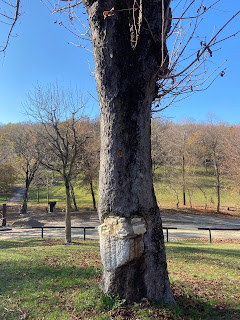
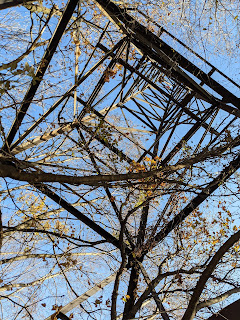
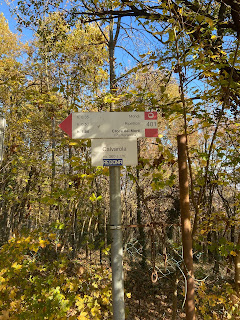
Left: A tree in Maresana with a little mason work.
Center: A tower near Colle di Ranica.
Right: Typical signage to watch out for in the Parco dei Colli di Bergamo.
![[Asteraceae] Erigeron annuus - Eastern Daisy Fleabane (Cespica annua). [Asteraceae] Erigeron annuus - Eastern Daisy Fleabane (Cespica annua).](https://blogger.googleusercontent.com/img/b/R29vZ2xl/AVvXsEjTrHP86-X2UmvkEAsMQVCB6phuicIAF3PT58iN-ewEmNt1zhBNYnORxwedXIJLcwBbvgaR5UjUgcDTARJrVwRhgO0_lj1s-b7iXkw6B8QCx_n6w7UGzFtByYKMcwOJ_OWqtw05Qnol7vQ/s320/Tuesday+hike+-+Erigeron+annuus+-+Tall+Fleabane.jpg)
![[Dennstaedtiaceae] Pteridium aquilinum - Common Bracken (Felce quilina). [Dennstaedtiaceae] Pteridium aquilinum - Common Bracken (Felce quilina).](https://blogger.googleusercontent.com/img/b/R29vZ2xl/AVvXsEjtmwqU8J6hv4-6NtSsBpVi6drxSY3HNAoCwmo9zxZR8DBXTQUI9tvZKKOFRbbSeajqVYnHpjLFsQHOOiNBFSagO-lBn1GK2DnU780wuNsk8PJr09sOHhWDi7YCwKUAwivP4ZgqQmehxwk/s320/Tuesday+hike+-+Pteridium+aquilinum+-+Bracken+fern.jpg)
Left: [Asteraceae] Erigeron annuus - Eastern Daisy Fleabane (Cespica annua).
Right: [Dennstaedtiaceae] Pteridium aquilinum - Common Bracken (Felce quilina).
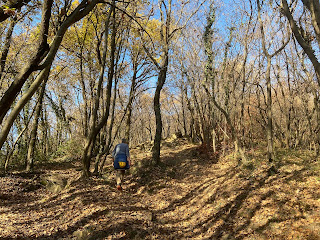
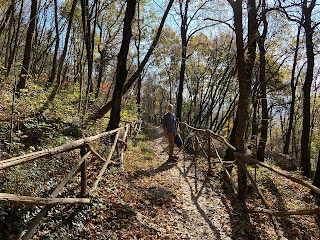
Left: Heading up to Colle di Ranica.
Right: Above via Valle in Monterosso.
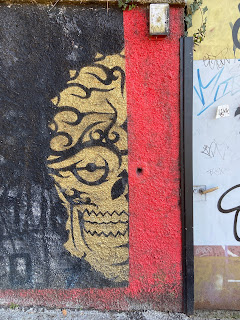

Left: A face on the wall on via Valle.
Right: A sort-of roccolo on trail 401 in Bergamo - Torre Boldone.

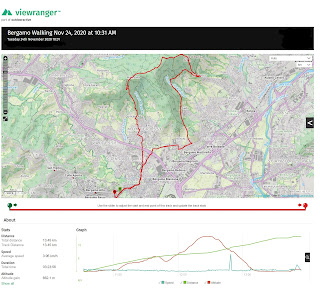

No comments:
Post a Comment
All comments are moderated. If your comment doesn't appear right away, it was likely accepted. Check back in a day if you asked a question.